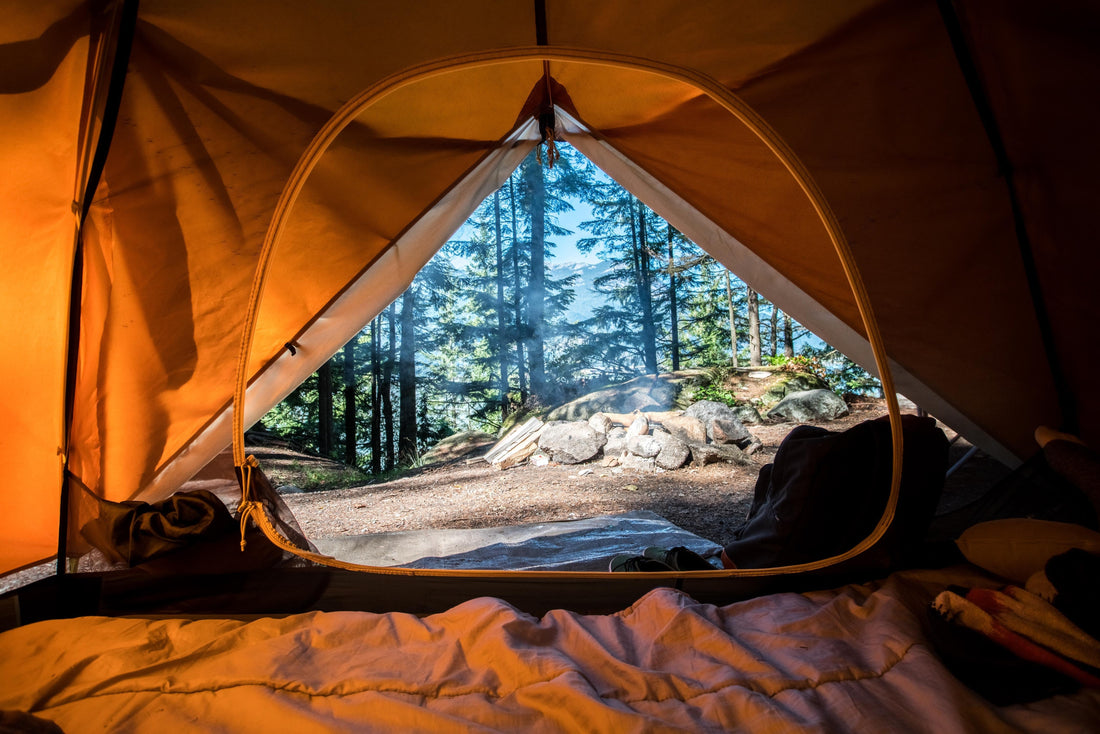
7 Tips for Getting the Best Sleep While Camping
Josie SivignyThis summer, we’re all looking for more fresh air and time away from home. There’s no better way to reset than a camping trip, but in order to maximize the R&R, you’ll need a plan to get the best sleep possible. Sleeping in a new place can be tricky enough, but sleeping outdoors can bring strange sounds and experiences that might keep you up more than usual. These tips will help you stay well rested and alert for the rest of your camping trip, no matter your camping style.
Know your limits
If you’re brand new to the great outdoors, sleeping on the ridge of a mountain with no tent during monsoon season probably isn’t the route for you. Know your experience level, and your limits. If you’re more of a camper family than you are a sleeping-under-the-stars family—that’s okay! Everyone starts somewhere. Make sure to thoroughly research the weather conditions, burn limitations, and expected wildlife in the area that you’re planning to visit.
Pick a smart location
Picking the right place to set up camp is imperative to getting the best sleep while camping. When you’re settling down in the daylight, think about your night. How will this area look in the dark? Will it be easy to navigate if you have to get up in the middle of the night, or will it be a risk for tripping or stumbling down a hill? Avoid huge tree root systems or rocks, and be mindful of how much sun your tent will get in the morning. If you’re hoping to sleep in, you may want to find a shadier spot. If you’re using the sun as a natural alarm clock, place your tent in in the sun’s path.
Pick a flat, relatively clear area so you aren’t dealing with weird nooks and crannies in the ground, and orient your tent depending on the kind of camper you want to be. If you’re with a group of friends and don’t mind staying up late with the night owls, set your tent up closer to the fire. If you need a less exciting soundtrack to fall asleep, position your tent away from the fire.

Invest in what matters
While you definitely don’t need a ton of fancy equipment to have a great time camping, consider investing in the products that will help your body rest. You’re likely hiking and participating in plenty of physical activity throughout the day, so getting the recovery you need at night is key.
Sleeping bag
Depending where you’re planning to set up camp, a good sleeping bag can make or break your trip. If you’re looking to camp in colder weather, you’ll need a sleeping bag with high quality insulation and rated for low temperature camping. Read more about choosing a sleeping bag.
Topper
You don’t have to sleep directly on the ground to get the most of your camping trip! Some campers prefer air mattresses, but they can be risky if you aren’t able to find a power source to inflate it or a rock may puncture it. A mattress topper can be just enough pressure relief without any added accessories. You can get a Twin XL and roll it neatly up with a sleeping bag so you have that added comfort when you’re ready to turn in for the night.
Don’t be afraid of the dark
For some people, sleeping in total darkness while in an unfamiliar area can be unsettling. Electronic lanterns, battery powered book lights, or even a simple head lamp strapped around a gallon of water can create a less intrusive glow that won’t leave you in total darkness in those super late and early hours.
Sound can also be a huge factor while sleeping on a camping trip. If you’re unable to find a spot that naturally has a nice white noise effect (near a stream, for example) earplugs can help a lot to block out any ambient noises you may notice. Being outdoors can create a bit of hyper-awareness that you wouldn’t normally have, so every small noise might keep you awake.

Keep your routine
Keeping some version of your bedtime routine can help you sleep better while away from home, no matter whether you’re camping or in a fancy hotel. Even out in the woods, you can still maintain a stripped down version of your routine. Instead of showering, take a few minutes to wipe down your face and hands. Read for a few minutes before bed, drink a nice warm mug of chamomile tea by the fire, anything that helps you mentally unwind and relax before bedtime.
Listen to your body
Camping trips are often accompanied by hiking, outdoor games, booze, and all sorts of exhausting activities. If you’re going to be out for a long trip, paying attention to your hydration levels, food you’re eating, and exhaustion level is incredibly important to your health in general, but also your sleep.
Smart meals
Eating a heavy meal right before bed can cause restless sleep from digestion issues. Try to keep any meals before bed protein-focused, but if you do want to eat something on the heavier side, give yourself a few hours before turning in for the night.
Don’t over hydrate
You don’t want to have to get up to pee a thousand times when you’re camping—keep the major hydration to daylight hours.
Be prepared
While there’s likely not going to be anything too crazy happening in the dead of night, you’re never totally in the clear while camping. Keep your shoes, a flashlight or headlamp, your car keys and wallet, and a pocket knife readily accessible. If anything crops up while you’re sleeping, you don’t want to be stuck searching for essentials.



